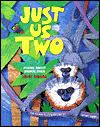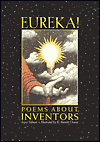
There are two earlier poetry collections written by Joyce Sidman. I am sorry to say that JUST US TWO: POEMS ABOUT ANIMAL DADS (2000) is out of print. (Fortunately, I was able to acquire new copies from an online bookseller—at a very good price.) It’s a novel idea: a book of poems that explains how some animal fathers care for their young. Here again, Sidman varies her style and her use of poetic forms. The collection includes Mouse Haiku, a lovely poem written in three haiku stanzas, and If I Were an Egg, a concrete poem about the emperor penguin written in the shape of an egg. Egg Business, a fast-paced humorous poem, is told in the voice of a daddy giant water bug.
Here is the first stanza of Mouse Haiku:
Blind and tissue-skinned,
tiny mice enter the world
in a nest of grass.
From Egg Business
Busy, busy:
I’ve got eggs.
Real tight schedule:
I’ve got eggs.
Up at dawn
to clean the eggs.
Deep-knee bends
to rinse the eggs.
Swim up top
to warm the eggs.
Dive down fast
to hide the eggs.
Sit in sun
to dry the eggs.
Life is tough
when you’ve got eggs…
In the back matter, Sidman includes factual information about ostriches, poison-arrow frogs, peregrine falcons, and other animals that are the subjects of her poems. Susan Swan created the book’s colorful three-dimensional cut-paper illustrations.

EUREKA!: POEMS ABOUT INVENTORS (2002) is a poetry book that might appeal to kids—grades four and up—who have an avid interest in science and inventions. The book’s narrative poems are written in free verse. Many of them are also persona poems told in the voice of the inventors and discoverers who are the subjects of the poems. These subjects include Johann Gutenberg, Leonardo da Vinci, George de Mestral of Velcro fame, and Ts’ai Lun who developed the method for making true paper nearly one thousand years ago. The book takes us through time from the prehistoric discovery of clay to the invention of the World Wide Web in 1991. There’s a humorous poem entitled Ode to Spode about Josephine Cochrane, inventor of the first dishwasher—and even a poem about the woman who invented the bra. (Three cheers for Mary Crosby’s biggest supporters!) And let’s not forget Food for the Gods about the man who created the first chocolate bar. (He’s my hero!) In The Light—Ah! The Light, Madame Curie tells about the obstacles and hardships she faced in her lifetime. It is a powerful piece.
From The Light—Ah! The Light
For the subject of my doctorate,
I chose uranium.
Just a lump of stone—but it shone!
The work was brutal:
a ton of ore to be hauled, cracked, incinerated
for one pure gram of radium.
I kept a bowl of it at my bedside
so I could wake at night
to see its fairy glow.
In the end,
that glow ravaged my skin,
poisoned my blood.
I was like the shell of a burned-out tree.
But what of it?
I, Manya,
the poor Polish girl from Warsaw,
pried open life’s hidden heart
and discovered the bright burn
of its decay.
This collection is divided into sections: The Tapestry of the Past, The Age of Invention, A Light Interlude, and Dawn of the Modern Age. As she does in many of her books, Sidman includes additional information about the inventors and discoverers at the end of each section. This book is finely illustrated by K. Bennett Chavez. Eureka! is an excellent classroom resource. There is more than poetry and science information contained between the covers of this book—there is history, too.
Suggestion: Have children write biography poems about famous people they have read about instead of requiring the typical assignment of writing book reports about the biographies they read. It might generate a little more enthusiasm and creativity. Sidman’s fine poems can serve as examples and inspiration for your students.

Sidman’s MEOW RUFF: A STORY IN CONCRETE POETRY (2006) is written for a younger audience and is a departure from her other works. It’s an innovative, charming story of a budding friendship between two natural enemies that’s told in concrete poetry. When a lightning storm rolls in, a cat and a dog take shelter from the rain beneath a picnic table, huddle together for safety and warmth, and form an attachment. Michelle Berg’s illustrations, created in Adobe Photoshop and Adobe Illustrator, are eye-catching and work wonderfully with the text. I have just one criticism: Some of the text is difficult to read. Still, this is a neat book and a good way to introduce children to this form of poetry. It is also unique. I can’t recall ever reading a story for children written in concrete poetry.
Millbrook* was the publisher of JUST US TWO and EUREKA! Houghton Mifflin is the publisher of the other four books. Three cheers for the editor(s) at Millbrook who had the insight to accept the talented Sidman’s first two poetry manuscripts for publication! And three more cheers for Houghton Mifflin!
(*Millbrook was bought by Lerner who now markets EUREKA!)
Visit Joyce Sidman’s website where you will find the following:
- A Poetry Now challenge
- Poetry Starters
- Tips for writers
- Teacher's guides for her books
- Excerpts from her poetry books
- Pictures of Merlin and her new dog Watson
Joyce Sidman’s next book will be published in spring 2007. It is entitled THIS IS JUST TO SAY: POEMS OF APOLOGY AND FORGIVENESS. It contains a series of poems written by a fictitious class of 6th graders. The poems are modeled on the famous poem by William Carlos Williams.
Happy Poetry Saturday!

2 comments:
Nice posts you're doing! Thanks!
Psssst. You won a prize in the "great passages" contest. Come see!
Post a Comment